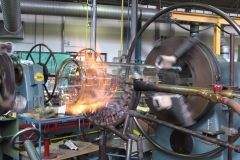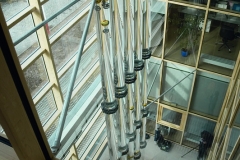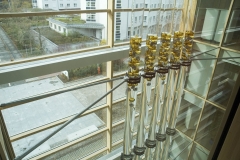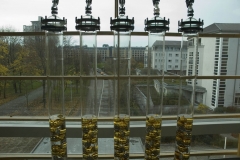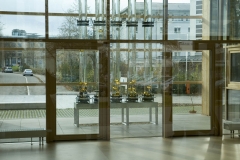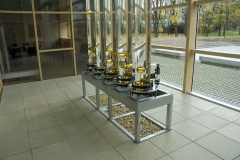GALILEI-THERMOMETER, University of Freiburg,
material: glass, peg liquid, glass bowles, aluminium
measures: approx. 1100x250x50 cm
location: Institut für Infektionsprävention, Universität Freiburg-Zentrum Naturheilkunde
“Galileo’s Principle: A Sculptural Thermometer” is a permanent installation in the Department of Environmental Health Science
Description of “Galileo’s Principle: A Sculptural Thermometer”
The concept:
Five pillars of glass were installed in the fully glazed ”Energy Garden”, which faces the entrance of the newly built “Department of Environmental Health Sciences”. Every glass cylinder contains 25 mouth blown glass bulbs, each attached to a small, carefully measured metal weight.
Through their appearance, these metal weights make reference to the trivial graphics of happy faces, commonly known as “smilies”. The cylinders are each filled with a precise quantity of PEG solution. By means of a special process, the glass bulbs have also been weighed out and filled with PEG solution, specifically designed to their temperature value.Due to unusually strong thermal fluctuation in the “Energy Garden” (up to 20 degrees Celsius per day) and the resulting change of liquid density within the cylinders, the glass bulbs either float to the top of the cylinders or sink to the bottom. This movement is hardly perceptible as it takes place over an extended period of time. The cylinders are approximately 10 inches in diameter and 36 feet tall. They are supported by a metal base frame. Due to their height, the glass cylinders can be seen and experienced in different aspects and angles from each of the building’s three floors.As the glass bulbs are constantly floating up and down, they continually form new constellations within the cylinders, depending on the season, time of day and insolation. This project was carried out in 2006, in collaboration with the Planning and Building Department, University of Freiburg / BreisgauPfeifer. Kuhn. Architekten, Freiburg / QVF Engineering, Mainz, / Ingenieurbüro Delzer, Lörrach / Firma Lenz Laborglas, Wertheim / TU München / Glasbläserei Reinhard Herzog, Wertheim
